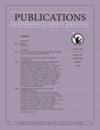北冕座 R 星的红外普查 II--光谱分类及其对低质量白矮星合并率的影响
IF 7.7
3区 物理与天体物理
Q2 ASTRONOMY & ASTROPHYSICS
Publications of the Astronomical Society of the Pacific
Pub Date : 2024-08-04
DOI:10.1088/1538-3873/ad6210
引用次数: 0
摘要
我们利用帕洛玛-加蒂尼红外巡天(PGIR)的数据,对银河系中的R Coronae Borealis(RCB)星进行了系统的红外普查,并展示了普查结果。RCB 星是多尘、不稳定的变星,可能是由 He 核和 CO 核白矮星(WD)合并形成的。PGIR 是一台 30 厘米的 J 波段望远镜,配有一台 25 平方英寸的照相机,以 2 天的频率勘测 18,000 平方英寸的北部天空(δ > -28°)。利用 PGIR J 波段 6000 万颗恒星的光曲线和 WISE 的中红外颜色,我们选出了 530 颗候选 RCB 恒星样本。我们获得了这些候选星的近红外光谱,并在样本中确定了 53 颗 RCB 星。考虑到我们的选择标准,我们发现银河系中总共有颗 RCB 星。假设RCB的寿命很短,那么RCB的形成率为0.8-5 × 10-3 yr-1,这与He-CO WD合并率的观测和理论估计值一致。我们在 RCB 星的 PGIR 光曲线中寻找准周期脉动,并给出了 16 颗 RCB 星的脉动周期。我们还研究了 RCB 星和化学性质相似但无尘的缺氢碳星(dLHdC)的高分度 TESS 光曲线。我们发现,dLHdC 星的变化时间尺度比 RCB 星短,这表明它们的质量可能比 RCB 星低。最后,我们发现了3颗新的经光谱学证实的银河DY Per型恒星和12颗候选的银河DY Per型恒星--它们被认为是RCB恒星的寒冷表亲--这使得银河DY Per型恒星的样本增加了一倍。本文章由计算机程序翻译,如有差异,请以英文原文为准。
An Infrared Census of R Coronae Borealis Stars II—Spectroscopic Classifications and Implications for the Rate of Low-mass White Dwarf Mergers
We present results from a systematic infrared (IR) census of R Coronae Borealis (RCB) stars in the Milky Way, using data from the Palomar Gattini IR (PGIR) survey. RCB stars are dusty, erratic variable stars presumably formed from the merger of a He-core and a CO-core white dwarf (WD). PGIR is a 30 cm J-band telescope with a 25 deg2 camera that surveys 18,000 deg2 of the northern sky (δ > −28°) at a cadence of 2 days. Using PGIR J-band lightcurves for ∼60 million stars together with mid-IR colors from WISE, we selected a sample of 530 candidate RCB stars. We obtained near-IR spectra for these candidates and identified 53 RCB stars in our sample. Accounting for our selection criteria, we find that there are a total of RCB stars in the Milky Way. Assuming typical RCB lifetimes, this corresponds to an RCB formation rate of 0.8–5 × 10−3 yr−1, consistent with observational and theoretical estimates of the He-CO WD merger rate. We searched for quasi-periodic pulsations in the PGIR lightcurves of RCB stars and present pulsation periods for 16 RCB stars. We also examined high-cadenced TESS lightcurves for RCB and the chemically similar, but dustless hydrogen-deficient carbon (dLHdC) stars. We find that dLHdC stars show variations on timescales shorter than RCB stars, suggesting that they may have lower masses than RCB stars. Finally, we identified 3 new spectroscopically confirmed and 12 candidate Galactic DY Per type stars—believed to be colder cousins of RCB star—doubling the sample of Galactic DY Per type stars.
求助全文
通过发布文献求助,成功后即可免费获取论文全文。
去求助
来源期刊
CiteScore
6.70
自引率
5.70%
发文量
103
审稿时长
4-8 weeks
期刊介绍:
The Publications of the Astronomical Society of the Pacific (PASP), the technical journal of the Astronomical Society of the Pacific (ASP), has been published regularly since 1889, and is an integral part of the ASP''s mission to advance the science of astronomy and disseminate astronomical information. The journal provides an outlet for astronomical results of a scientific nature and serves to keep readers in touch with current astronomical research. It contains refereed research and instrumentation articles, invited and contributed reviews, tutorials, and dissertation summaries.

 求助内容:
求助内容: 应助结果提醒方式:
应助结果提醒方式:


